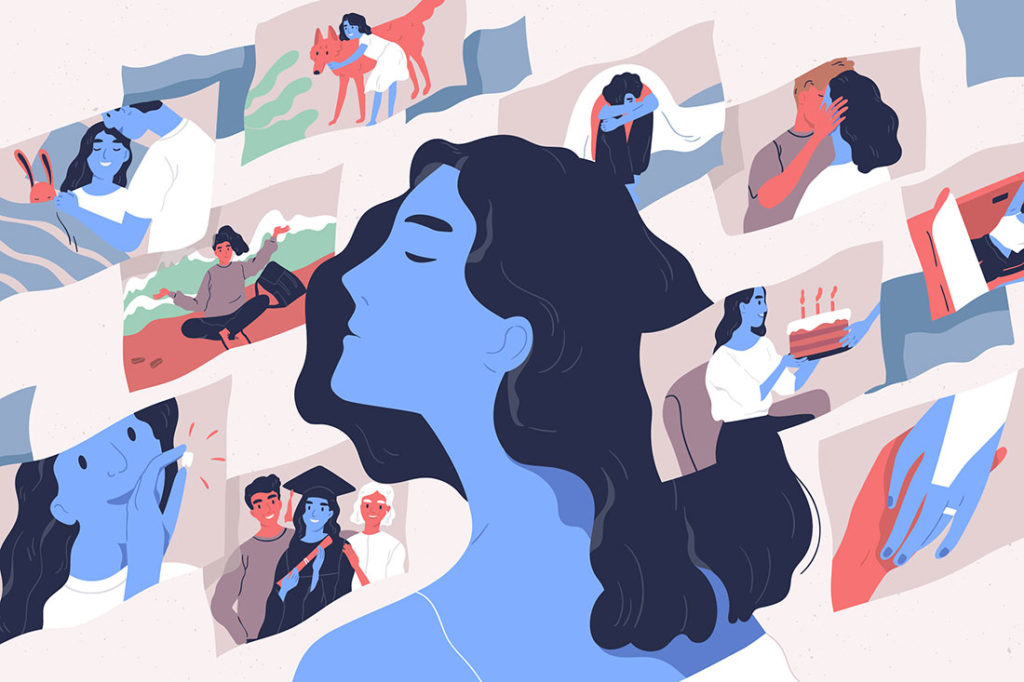I’m walking through Central Park in New York City. I see an expansive lawn beneath a bridge to my right, and the memories come flooding back. My then-boyfriend (now husband) and I had just returned to the city after summer break. We spent the entire day lying on a blanket enjoying the late summer weather. We were young, carefree and in love.
Nearly a decade has passed since that day. I marvel at how it feels like just yesterday.
The following day, I’m walking through Washington Square Park, the hub of our college’s sprawling campus. I see the dorm where my best friend lived during freshman year. I remember the colorful, grungy coffee shop around the corner where I journaled incessantly late at night. I pass by my first real apartment, a seventh-floor walkup I lived in senior year.
In the weeks following my trip to New York, I felt overwhelmed by how nostalgic I was. My memories were pure and simple and full of joy, and they helped me get through a particularly difficult time in my life.
It turns out that what I was feeling is backed up by science. Research has shown nostalgia can help us feel more optimistic about our futures when we’re going through tough times. One researcher who studied the positive effects of nostalgia on mental health summed it up perfectly: It acts as “a psychological immune response that is triggered when you experience little bumps in the road.”
Nostalgia can also raise our self-esteem, encourage inspiration, and combat loneliness, depression and anxiety.
Shannon Curry, a licensed psychologist based in Newport Beach, California, says Svetlana Boym, author of The Future of Nostalgia, identified two primary types of nostalgia: reflective and restorative. The former comprises a healthy acceptance of the past and firm grounding in the present, while the latter involves a lack of acceptance of the present and a desire to restore situations from the past that might not be healthy or even feasible.
Curry says reflective nostalgia has myriad psychological benefits.
“Human beings are meaning-makers, and nostalgia provides us with an automatic mechanism to reflect on the past and draw meaning from our experiences,” she says. “When we experience the ‘good’ kind of nostalgia, we are reminded of meaning and purpose in our lives—the sort of stuff that shores us up for the journey ahead.”
There is significant benefit to reflecting on the past when we’re facing new challenges in the present, Curry says. “Thinking about where we’ve been, the things we’re proud of and grateful for, and how far we’ve come has been shown to be one of the most effective strategies for reaching new goals,” she says.
Despite how much pleasure my college memories brought me, I also felt somewhat melancholic when reminiscing, if not downright sad at times. This isn’t surprising, as feelings of longing are a core component of nostalgia.
“The word nostalgia has ambivalence in it,” says Jim Gordon, M.D., a psychiatrist and founder of The Center for Mind-Body Medicine in Washington, D.C. “Nosto is home and algia is pain. [The word] is already suggesting that there’s going to be pain in some of those memories… There is a longing in it, and it means we don’t have what we need in the present.”
I pondered this at length. Despite some recent setbacks, I felt content in the present. I had a fulfilling career, a loving marriage, interests that kept me busy and a great support system. I began wondering why my college days filled me with such a strong sense of nostalgia, and then it hit me: I was longing for how carefree, fun and spontaneous those days were.
In addition to several major challenges this year, I found myself weighed down by the minutiae of adult life—oil changes, piles of laundry, monthly mortgage payments. Coupled with the isolation of being self-employed, my husband’s demanding medical residency schedule and busy friends with busy lives, I felt like the fun, spontaneous side of my life had vanished.
Gordon says the key to leveraging nostalgia’s benefits is to bring what you feel your present is lacking (in my case, a sense of feeling carefree and unencumbered) into the present.
In order to use my nostalgic memories to propel me forward, I needed to capture the feelings I missed most from back then. In the past few weeks, I’ve tried to have more fun (sounds simple enough, right?), plan less in order to encourage more spontaneity in my life, and make sure I spend significant time with those who make me happiest.
The following expert-backed tips and tricks can help you reap the psychological benefits of nostalgia in your own life:
1. Accept your present circumstances.
Curry says in order to benefit from nostalgia, you must be able to accept your present. “The past is a rich and robust resource for us to explore,” she says. “But growth is about moving forward. While we can reflect on the past, there are so many experiences yet to be had.”
2. Be on the lookout for rumination.
Although thinking fondly of the past can help us feel optimistic about the future, a little goes a long way. Listening to your favorite band from the ’90s is great. Wishing you were back in high school? Not so much.
“If we think about the past obsessively instead of just enjoying it, then it becomes a kind of repetitive loop in the brain called rumination,” Gordon says. “That slows us down and makes it difficult for us to move into our present life because we’re so preoccupied with what was as opposed to what’s going on right now.”
3. Be truthful about your emotions.
Are you insecure that your “best days” are over? Lonely and yearning for companionship? Missing your friends and feeling isolated? It’s important to fully understand what emotion your nostalgia triggers in order to make improvements in your life.
Curry says to ask yourself what your absolute worst fear is and whether attempting to recreate the past can prevent that fear from happening (hint: it can’t). “Once you’ve been honest with yourself about your intentions and the ineffectiveness of attempting to recreate the past, it’s a lot harder to indulge in rumination,” she says.
4. Take up meditation.
Gordon says an antidote to the longing that accompanies nostalgia is to become more in tune with the present.
“That’s what meditation is all about,” he says. “And that’s a major aspect of why meditation is so helpful for both anxiety and depression. If we stay trapped in the past, we can’t really move ahead with our lives. As you begin to relax into the present and appreciate it, there is less pain in the past and there’s less worry about the future.”
Image by GoodStudio / Shutterstock
[fl_builder_insert_layout slug=”amazon-affiliate-disclaimer”]










